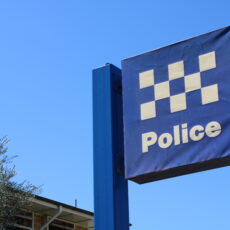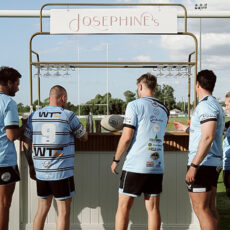Remembrance Day is always a solemn occasion but this year it carried a deeper poignancy and significance with the death of Wee Waa’s last surviving World War II veteran John Collett on November 11.
Shortly after Monday’s service at Memory Grove, news spread to attendees that John had died at about 11:15am.
The 98-year-old had been in many people’s thoughts during the minute’s silence, as community members and business owners paused at 11 o’clock on the 11th day of the 11th month to pay tribute to the remarkable women and men who have served and made sacrifices during conflicts and peace-keeping operations.
John served as a gunner in the 2/1st Field Regiment 6th Division in the Aitape-Wewak campaign in New Guinea during World War II.
The Aitape-WeWak campaign has been described as ‘hard, bloody and wearing’.
“It was a dirty war,” John once told The Courier.
“It would be a different Australia today if the Japanese had won, the way the Japanese troops treated the Australians was shocking.”
Deserving of the high praise but dismissive of fanfare, John had previously given The Courier strict instructions to call him John, not Mr Collett. A straight shooter, he’d call a spade a shovel.
John’s presence at commemorative services in town was a living reminder of the sacrifices made by so many, even during the Covid-19 pandemic restrictions John showed up at bugler Peter Carrett’s driveway at dawn for the sounding of the Last Post to honour his mates.
“You do think about your mates, you think about the ones you left behind and couldn’t get home,” John said at the time.
John witnessed first-hand the devastation and despair of the war, but he truly valued the mateship.
“The ones that were in your unit are the best in the world because you’d die for one another,” said John.
Catching a glimpse of John at services, especially in his later years, was a highlight.
He had local hero status. For example, after the 2022 Remembrance Day service he captivated the attention of some WWHS students. They thanked him for his service and asked him about his experiences.
A little gobsmacked, the senior students chatted about how John would have been younger than them at the time he put his hand up to go to war.
John previously told The Courier he was “16 and 9 months” when he signed up to join the war effort.
Of course, you had to be 18 years old, but John certainly wasn’t the only young man who managed to wrangle together a ‘signed’ letter to join his mates and fight for Australia’s future.
“Some of the other young blokes had left to go, and I thought, ‘well, I’m going to go too’,” said John.
Young, fearless, and looking for a new start.
“It was something to do,” he said.
After the war, John lived in Wee Waa. It’s the town where he married his late wife Fay and where they raised their children and made a home.
“She was a very nice looking girl and everything about her was pretty good actually,” John previously told The Courier.
“Buggered if I know how I got to end up with her.
“We went together for a little while, then we decided to get married, and we were married 61 years.
“She was a telephonist at Burren on the exchange and she worked as a nurse at the hospital.”
The couple had three children Gary, Terry and Judith, and more than 20 grandchildren and great-grandchildren.
John turned his hand to many jobs, mostly roles on the land such as working in shearing sheds across the North West and New England region.
A well-known Wee Waa identity, he was a lifetime member of the Wee Waa Bowling Club and Wee Waa Panthers.
Vale John Collett 28.08.1926-11.11.2024
A further report and photos about Remembrance Day in Wee Waa will feature in a future edition and online – narrabricourier.com.au
To order photos from this page click here









